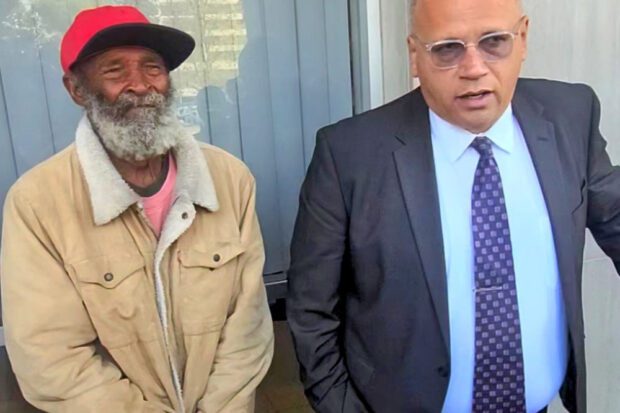
On April 10, Fresno Superior Court Judge Brian Alvarez ruled that the Fresno City Attorney’s Office failed to meet the 45-day deadline to bring an unhoused individual to trial; 77-year-old Wickey Two Hands was accused of violating the City’s harsh no camping ordinance implemented on Sept. 23, 2024. California law states that a defendant on a misdemeanor charge must be brought to trial within 45 days, if out of custody.
Attorney Kevin Little, representing Two Hands, said, “On Feb. 20, we insisted on our right to a speedy trial and objected to any postponement. Today is well beyond the deadline so this judge just wasn’t having it. He saw that this was not a lawful continuance and therefore dismissed the case.”
Judge Alvarez noted that the case should have been heard by March 6.
Two Hands, the defendant, said he was glad it was over. “I think I deserve [this dismissal] and want to thank Kevin. He has my admiration.” He said he has lost work because of the trial and that he holds down several jobs. He has been offered a housing voucher, but it could take weeks to get an apartment.
On April 10, the City again offered Two Hands a diversion program before the case was rapidly dismissed. These programs often involve rehabilitation, community service or other interventions designed to address “the behavior” that led to the arrest. In this case, there were no substance abuse issues, the defendant had several jobs and his only “crime” was being unhoused at the time of his arrest.
To date, there have been more than 400 arrests in Fresno for violations of the no camping ordinance and numerous citations. The Democratic majority on the City Council passed the no camping ordinance following a Supreme Court ruling that allowed cities to enforce camping bans, even when shelter is unavailable.
The Democrats on the Council sided with the conservative Republican justices on the court, ignoring the three liberal justices who said in the dissenting opinion that allowing municipalities to arrest people is criminalizing a basic human function: sleeping.
The Fresno ordinance “criminalizes people’s existence,” said Little. “It sends them into hiding.” He was a bit disappointed with the dismissal in that he had wanted to take the Two Hands case before a jury and pursue it on legal grounds.
“Sooner or later, we’ll have our day in court,” added Little. “[But] if the City never takes these cases to court, it begs the question: Why do we even have this stupid ordinance in the first place?”
The blatant disregard for time limits by the City Attorney’s Office raises the question if that was intentional to avoid a jury trial. Several more cases are being set for trial.
More than 25 California cities have passed similar ordinances. In response to the proliferation of such ordinances, many California cities, including Fresno, have increased sweeps of encampments, leading to the displacement of unhoused individuals, with little to no guarantee of alternative housing or services.
Violations of anti-camping laws can result in fines and even jail time. Criminalization can make it harder for unhoused individuals to find stable housing and employment, as arrests and criminal records can create barriers.
Arrests and sweeps increase morbidity and mortality rates, as the stress of frequent moves and interactions with law enforcement can exacerbate health problems. In addition, jail stays can disrupt access to benefits, shelter and other crucial resources. Displacement and criminalization can be traumatizing and damaging to the health and well-being of unhoused individuals, according to the research.
Criminalization is also ineffective in solving homelessness and addressing the root causes of homelessness, which include lack of affordable housing, and can even perpetuate the cycle of homelessness. Moreover, it costs taxpayers; arresting and incarcerating unhoused individuals under laws that criminalize homelessness is expensive. In addition, the criminalization of homelessness can increase the risk of violence against unhoused individuals and increase their interactions with law enforcement.
In response to the many no camping ordinances, SB 634, introduced on March 24 by State Senator Sasha Pérez (D–Alhambra), is working its way through the legislative process. If enacted into law, the bill would prohibit local and state authorities from imposing penalties, including jail time and fines, on unhoused individuals for acts related to their basic survival, and protects those providing assistance to homeless individuals.
